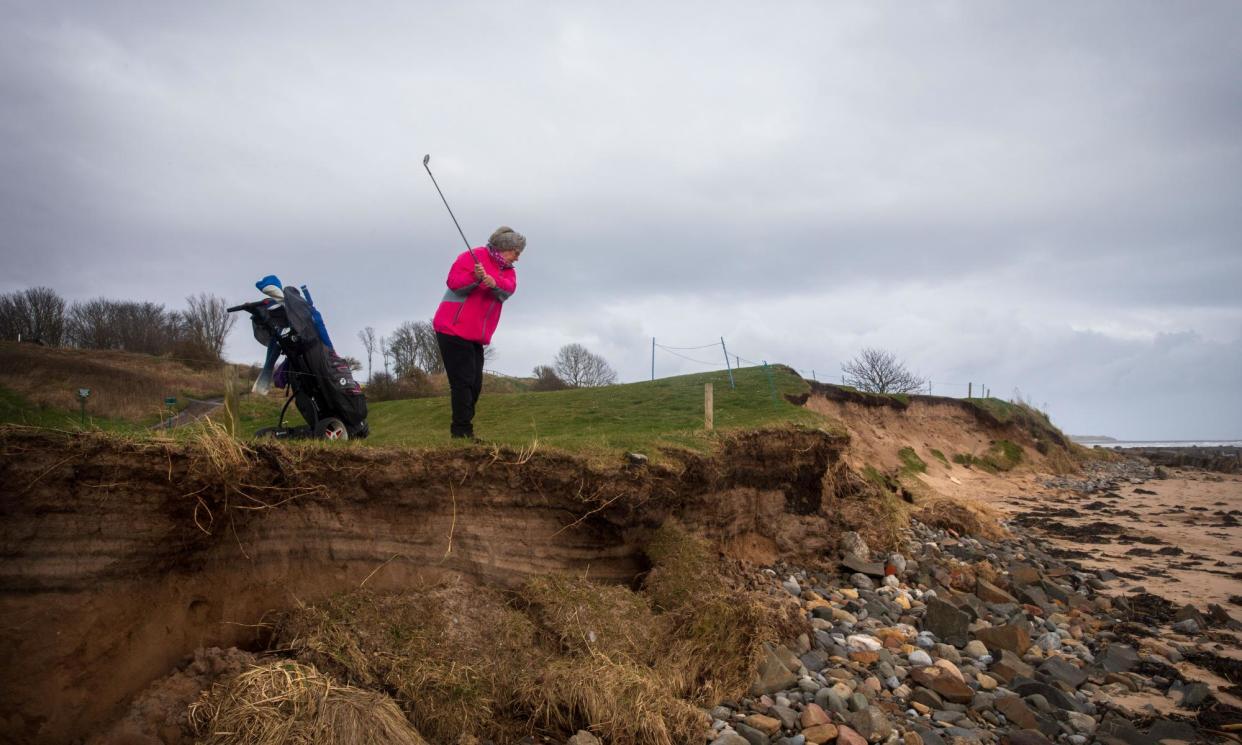‘Awful’: climate crisis threatens to sink historic north-east golf club

For most golfers, the most damage a furious wind can do is to your handicap – and, if you are really unfortunate, your car windshield.
But visitors to Alnmouth village golf club in Northumberland have to contend with the prospect of storms and rising sea levels consigning the oldest nine-hole links course in the country to history.
There are fears that the historic golfing attraction will disappear as a result of coastal erosion, the undefended area closest to the sea near the fifth hole is especially at risk.
“I don’t think in another 100 years we will be playing golf here, I think it’s changed that much in the last 30 years,” said the club secretary Ian Simpson, who has been a member for more than a decade.
Simpson’s daughter, Emelia, who is club manager, added: “No one wants to play on an eight-hole golf course.”
Built in 1869 by the Scottish golfer Mungo Park, it is classed as being in an area of natural outstanding beauty (AONB) and it counts the Northern Irish professional Ronan Rafferty and the former Dutch football international Ruud Gullit among its past members. The club said at least 25 to 30 yards of the course closest to the sea had eroded, with bath houses that lined up along the boundaries being washed away and about 10ft of sand having been lost by the second and third tee.
Valerie Barkley, a member of four years, said golf was the only sport she liked and being part of a strong female representation at the club – which has about 10,000 visitors a year.
She said: “The ladies section meet on Wednesday and play competitions. I’m on the committee, we’ve brought friends that have gone on to join. If it was to go it would be awful, I’m rather selfishly hoping not in my lifetime.”
Ian Simpson has suggested rock armour, which is used in harbours to defend coastlines, may solve the issue but matters had been complicated by the fact that the club is on private land owned by the Duke of Northumberland and maintained by patrons, the burgage holders of Alnmouth Common. The club cannot drastically alter the makeup of the coastline without permission.
The climate campaign group One Home sees the golf club, and neighbouring village, as symbols for wider trends of losing sporting, recreation, heritage and religious sites along the whole of English coast.
Angela Terry, the chief executive of One Home, said: “On top of these losses, infrastructure including roads and landfill sites, businesses and homes are falling into the sea at an accelerating rate.
“The government’s response is to pass responsibility between overstretched and often bankrupt local authorities and the Environment Agency teams who are working desperately hard to hold back the sea but it’s a losing battle due to sea level rise and stronger storms.”
Terry added that it was unlikely that any national coast erosion risk maps were updated with climate projections or land losses seen on the ground.
The Environment Agency points to funding awarded in February to Northumberland county council to enforce flood management and coastal erosion control and use as it sees fit.
A spokesperson for the council said protecting private land from coastal erosion was the responsibility of the landowner but contact had been made with Alnmouth golf club to offer advice on short-term solutions while longer term implications were being considered.
They added: “The majority of funding for coastal defence works comes from the Environment Agency and usually, to attract sufficient funding for a scheme to be viable, residential properties must be protected.”
Martin Swinbank, Green councillor for the local Alnwick ward, said a 100-year shoreline management plan, which runs from the Scottish border to the River Tyne, was launched in 2009. It aimed to intervene in the area where the club was based but the climate crisis accelerated by “human activity” – burning fossil fuels – had reinforced coastal erosion.
Anne-Marie Trevelyan, the Conservative MP for Berwick-upon-Tweed, said she had written to the culture and environment secretaries to seek their support to protect the club from the risk of coastal erosion.
She added: “While our unique Northumberland landscape is breathtakingly beautiful, it presents us with challenges too, which I will continue to take up with the government and other responsible bodies on behalf of my constituents.”


